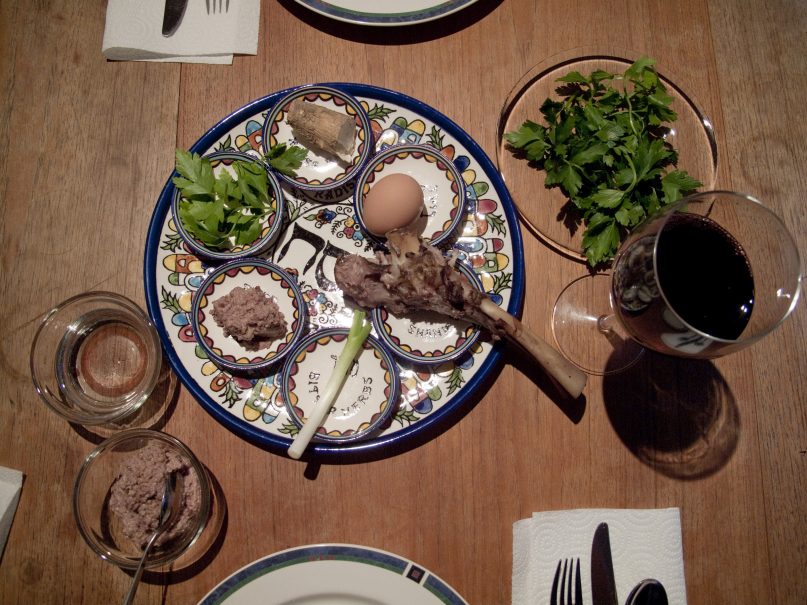Talk about being on the same page.
Here is the problem with many Passover seders.
Think about it: this is the only time during the entire Jewish year when an extended family and collection of friends sits down together for a meal, complete with (what is supposed to be) a Jewish conversation.
There is a high probability that your level of observance, knowledge, commitment, and ability to wait for dinner will be entirely at odds with at least some of your fellow sederites.
So, what do you do when you are not particularly enamored with what is going on around you?
My suggestion: sneak a book into seder, and read it behind the covers of the inevitable Maxwell House haggadah that was rescued from Aunt Sylvia’s house right before she moved to West Palm Beach.
What should you read — either at the seder, or better, before Pesach to prepare you spiritually and intellectually for the festival?
First, there are the “alternative haggadot” — books that you might want to refer to during the seder.
- A Passover Haggadah: Go and Learn, by David Silber and Rachel Furst. A wonderful compendium of small essays, each one illuminating a piece of the haggadah text and associated ideas. Kudos to the authors for hyper-texting around the rest of the Bible to find the echoes of the Exodus story.
- My People’s Passover Haggadah: Traditional Texts, Modern Commentaries, Lawrence A. Hoffman and David Arnow (two volumes). Probably the best overall commentary on the Haggadah, written by two undisputed masters of the craft.
- Seder Talk: The Conversational Haggadah, by Erica Brown. One of contemporary Judaism’s greatest adult educators turns her erudite, uber-literate attention to the themes of Passover. The book
- New American Haggadah, by Jonathan Safren Foer and Nathan Englander. Cool, contemporary, artistic. The commentaries are written by Deutsch, Jeffrey Goldberg (of the Atlantic), Rebecca Newberger Goldstein, and Lemony Snicket. My favorite quote, from Goldberg:
Do you live in a place where some people work two and three jobs to feed their children, and others don’t even have a single, poorly paid job? Do you live in a community in which the rich are fabulously rich, and the poor humiliated and desperate? Do you live among people who worship the golden calves of obsessive acquisitiveness, among people whose children are blessed by material abundance and cursed by spiritual impoverishment? Do you live in a place in which some people are more equal than others?
- For This We Left Egypt? A Passover Haggadah For Jews and Those Who Love Them, by Dave Barry, Alan Zweibel, and Adam Mansbach. You have to love a haggadah that is more like Mad magazine than a sacred text – especially when the humorist Dave Barry has a hand in it. (Dave Barry? Yes, he is married to a Jewish woman).
My favorite quote (there are so many):
The Pharaoh who hired Joseph and welcomed the Israelites to Egypt seems like he was pretty chill, but his son turned out to be a major putz. This kind of thing seems to happen a lot. Look at Han Solo and Kylo Ren, for example. Or Martin and Charlie Sheen.
Then, there are books that you might want read as preparation for their insights into the grand themes of Pesach.
- On Tyranny: Twenty Lessons from the Twentieth Century, by Timothy Snyder. A noted historian of the Shoah scans its dark pages for the lessons that will shape our consciousness in the years ahead.
On February 2, 1933, for example, a leading newspaper for German Jews published an editorial expressing this mislaid trust:
“We do not subscribe to the view that Mr. Hitler and his friends, now finally in possession of the power they have so long desired, will implement the proposals circulating in [Nazi newspapers]; they will not suddenly deprive German Jews of their constitutional rights, nor enclose them in ghettos, nor subject them to the jealous and murderous impulses of the mob. They cannot do this because a number of crucial factors hold powers in check… and they clearly do not want to go down that road.”
Stand out. Someone has to. It is easy to follow along. It can feel strange to do or say something different. But without that unease, there is no freedom. Remember Rosa Parks. The moment you set an example, the spell of the status quo is broken, and others will follow.
- Exodus and Revolution, by Michael Walzer. One of the pre-eminent social philosophers of our time takes on the weighty subject of how the story of the Exodus from Egypt has reverberated far beyond itself. The influence of the Exodus has manifest itself in the history of revolutions, early American place names, literature, and even in the way that we tell stories — with a beginning, a middle, and an end.
The killer quote:
We still believe, or many of us do, what the Exodus first taught, or what it has been commonly been taken to teach, about the meaning of politics and about its proper form:
first, that wherever you live, it is probably Egypt;
second, that there is a better place, a world more attractive, a promised land;
and third, that “the way to the land is through the wilderness.” There is no way to get from here to there except by joining together and marching.
There is no one quote that “says it all,” but that last one comes pretty close.
A joyous, sweet, redemptive Pesach to you.
And whatever Egypt you’re in, may you get out of it!






